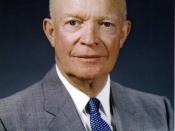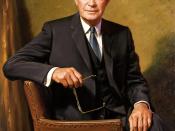The Conflict of Life and Death
"I hate war as only a soldier who has lived it can, only as one who has seen its brutality, its futility, its stupidity." Dwight D. Eisenhower, former General and President of the United States of America, had the right to say this, faced with the horrors of war throughout his career. Eisenhower knew the ferocity of war inside and out, from the vantage point of both a soldier and Commander in Chief. He knew what was like for Joe Bonham, a small town boy, forced to go into battle for a war that he knew nothing about. While struggling in a fight for a purpose that did not have anything to do with him, Joe suffered immense consequences; he lost his ability to talk, see, smell, move, hear, or even breathe. He became trapped in a cocoon of bandages, wrapping up the remains of his body.
He lost his arms and legs and was completely dead, with the exception of the somewhat coherent workings of his mind. The only possible way Joe could connect to the rest of the world was bobbing his head up and down, in attempt to communicate through Morse code. Dalton Trumbo published Johnny Got His Gun only two days after World War II broke out, an ironic detail considering the whole book centers on pacification and the horrors that war brings. Throughout the novel, Trumbo stresses and evils of war and the horrible effects of the hideous glower of war's face. Trumbo uses apostrophes, unique syntax and unmatched symbolism to effectively convey his message of the horrors of war.
Trumbo uses unique syntax in the writing of this novel. The novel, written as the thoughts of Joe, shares with the reader whatever happens to pass through...


